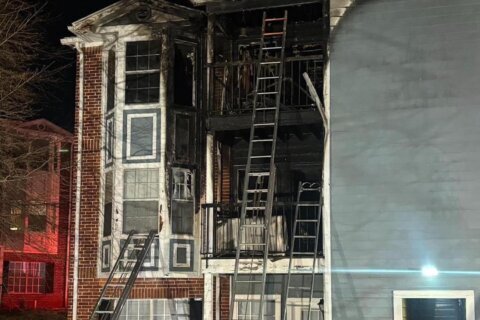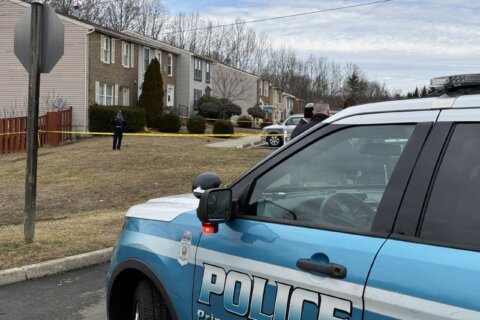This article was republished with permission from WTOP’s news partner InsideNoVa.com. Sign up for InsideNoVa.com’s free email subscription today.
This article was written by WTOP’s news partner InsideNoVa.com and republished with permission. Sign up for InsideNoVa.com’s free email subscription today.
Draft reports by the Prince William County Racial and Social Justice Commission broadly commend county practices while acknowledging areas of needed growth and further study.
The three draft committee reports were presented to the commission Nov. 18 during a meeting marked by disagreements, heated exchanges and personal jabs, leaving members visibly angry and frustrated.
The reports were displayed on screens at the meeting but not immediately made available to the public. InsideNoVa obtained copies of the reports following the meeting by filing a Virginia Freedom of Information Act request.
The panel is tasked with delivering a report that examines “the state of racial and social justice for people of color” in the county and making recommendations to the county government. Its initial focus is on policing, the “provision of government services” and public education.
The report by the government services committee was most direct with its overall findings.
“The [committee’s] overall assessment … determined that the programs and plans of the PWC services were mostly exceptional,” the report says. “We did not find any systemic/structural discrimination or social injustices. However, the [committee] does not claim that systemic/structural discrimination or social injustices do not exist, but only the data during this discovery did not yield such a claim.”
The meeting got off to a rocky start as the commission debated a “special order” to govern how discussion around the committee reports would occur both at the Nov. 18 meeting and the next one, in December. The commission spent more than an hour arguing over the phrasing in the document and recommending changes or additions.
The order was meant to limit presentations to 20 minutes each, followed by two segments of three minutes for questions or comments by each commissioner. That structure quickly flew out the window as speakers went over their time, argued about fairness and debated points of the draft reports.
Education
One of the most contentious committees and anticipated reports was on education, particularly as it relates to school-resource officers. However, there is no recommendation on ending or continuing the SRO program in the report.
Instead, the recommendation is to examine what other jurisdictions are doing instead of SROs and see what the effect has been from those decisions while gathering more data.
Although the committee made no firm recommendation on SROs, Brentsville Commissioner London Steverson said the county should “look into” removing them from schools.
“At first I was opposed to the SRO program because I don’t like having young people exposed to the criminal justice system,” he said.
The report noted disparities among students who are disciplined in schools and recommended an audit of the school division’s discipline practices. It also recommends increased transparency on teacher placements, Title I funding and accountability measures.
Policing
The policing committee largely commended the county’s increased transparency with data, while noting that people of color are disproportionately subject to force and arrest compared with their representation in the population.
The committee recommended that the county hire an independent contractor to examine the department’s use-of-force policies and practices.
The police department was also commended for its crisis intervention training and co-responder unit, which provides mental health services in response to certain calls for service.
The report noted the department is lacking the diversity of the community. Police Chief Peter Newsham has said that of the county’s 663 sworn officers, 75.3% are white, 11.3% are Hispanic and 8.7% are Black.
In comparison, the 2020 U.S. Census put the county’s population at 41.7% white, 25.2% Hispanic and 20.2% Black.
Government services
The government services report says the “most disconcerting” item was that only 1,573 residents completed the county’s 2018 community survey.
“The majority of the presentations did not yield a sizable number of concerns for government services,” the report says.
The government services report briefly touches on the county’s planning department, but makes no mention of the rural area, in which development is limited.
The report commended the Human Resources Department for removing questions about criminal history from employment applications, cutting barriers to jobs and maintaining a low turnover rate.
The committee recommended the county conduct more outreach to minority communities to improve diversity.
The committee also provided recommendations on increasing affordable housing, modernizing the Youth Detention Center and boosting diversity in management-level positions.
Jan. 6 reference sparks debate
The first extremely heated exchange came at the end of the policing committee’s report.
The imbroglio, which laid the groundwork for continuing arguments throughout the night, was over a single sentence.
The report says, “Due in part to social justice challenges in 2020/2021, (i.e. Defund the Police, lenient sentences for convicted Capital [sic] insurrectionists who assaulted police officers, COVID-19 vaccine mandates,) the attrition by way of retirements and resignations are higher than usual (PWC Police Human Resources Data).”
Prince William has not implemented a vaccine mandate for its employees, nor has the Board of County Supervisors reduced funding for the police department.
Steverson took issue with the mention of sentences for those convicted in the Jan. 6 attempted insurrection at the U.S. Capitol. He called it “more of a hoax than an insurrection,” “a spectacle that lasted only a few hours” and that it caused “minimum damage.”
Prosecutors have said the attack caused $1.5 million in damage.
The Cline Center for Advanced Social Research at the University of Illinois Urbana-Champaign classifies Jan. 6 as an attempted coup d’etat. The center says the attack was “an organized, illegal attempt to intervene in the presidential transition by displacing the power of the Congress to certify the election.”
Many of those convicted and charged in the insurrection have stated their intention to stop the certification of the 2020 presidential election.
Steverson described the shooting that day of Ashli Babbitt by U.S. Capitol Police as “tragic” and said, “No one has been charged, no one has even been named” in her shooting.
Lt. Michael Byrd publicly identified himself as the shooter earlier this year.
“The Jan. 6 incident was a celebration that ran amok,” Steverson said. “It was not violent.”
Neabsco Commissioner Christopher Frederick Sr., a former police officer and the policing committee lead, was visibly angry and loudly denounced Steverson’s comments.
“I don’t believe it was a hoax that happened at the Capitol. People died. Officers died,” he said. “I would challenge you to ask any of the widows of those officers if it was a hoax.”
Frederick said he would categorize the attack as a riot rather than insurrection, but was adamant that it was not peaceful.
“Those people weren’t out just having a good time,” he said. “They were there to hurt those officers.”
‘Shame on you’
Frederick’s comments exceeded the three-minute allotted time frame, but he was allowed to continue. That caused more problems.
Coles Commissioner Mac Haddow said rules aren’t enforced equally across the board. Gainesville Commissioner Erica Tredinnick attacked Chair Shantell Rock’s adherence to rules and continuously spoke over her.
Haddow also said county staff are biased in their work with the commission.
“We have a problem where this staff is out of control, in my opinion,” he said.
The meeting quickly devolved into several minutes of commissioners loudly speaking as some tried to maintain order.
Once order was regained, At-Large Commissioner Jahanzeb Akbar, the education committee lead, launched into his report.
After Akbar’s report, Haddow provided a “minority report” on the committee’s work. He said he was continuously stonewalled in his quests for data and disrespected and added that the committee ignored legitimate lines of inquiry because it didn’t fit the right political agenda. He said the report lacked concrete data and was mostly anecdotal.
After Haddow’s presentation, a visibly frustrated and exasperated Akbar went on the defensive, saying his committee took the same approach as the other two committees.
“I’ve had to suffer through lie after lie after lie,” he said. “Truth does not matter. … These lies are just too much to bear.”
Akbar also admonished other commissioners for not providing support in response to Haddow’s attacks.
“All of those people sitting silently, honestly if there’s not a defense of what I’ve had to suffer, if you are going to sit here quietly and let me be the one that takes the fall and make it seem like this is an even tit for tat, shame on everyone that’s going to do that,” he said. “
Rock provided some recognition of Akbar, but no others made comments supporting him. As the meeting ended, an upset Akbar quickly left the building, brushing off attempts at commendations from commissioners outside of the meeting.
The commission next meets Dec. 16 to vote on a full report to send to the Board of Supervisors.







